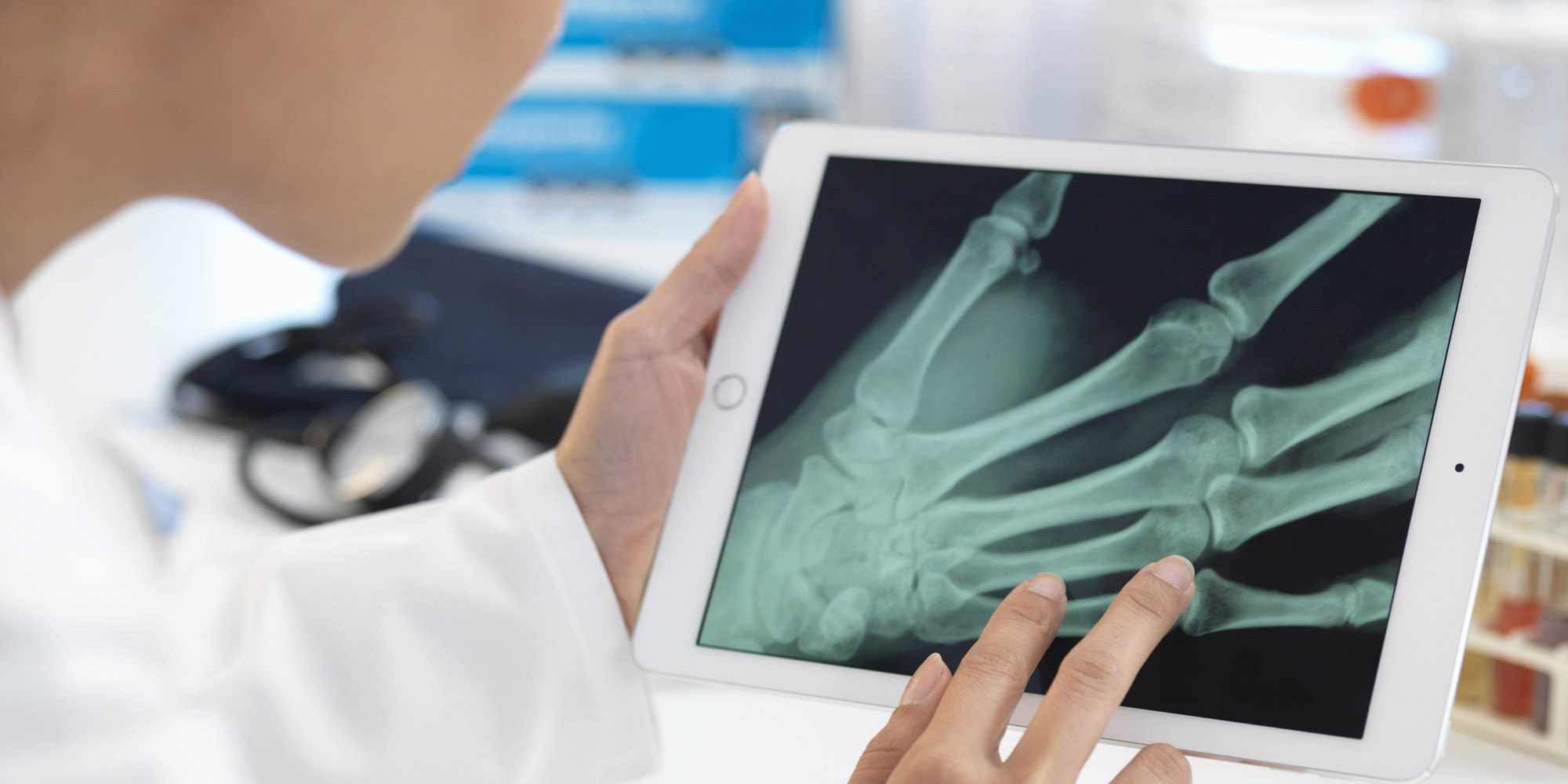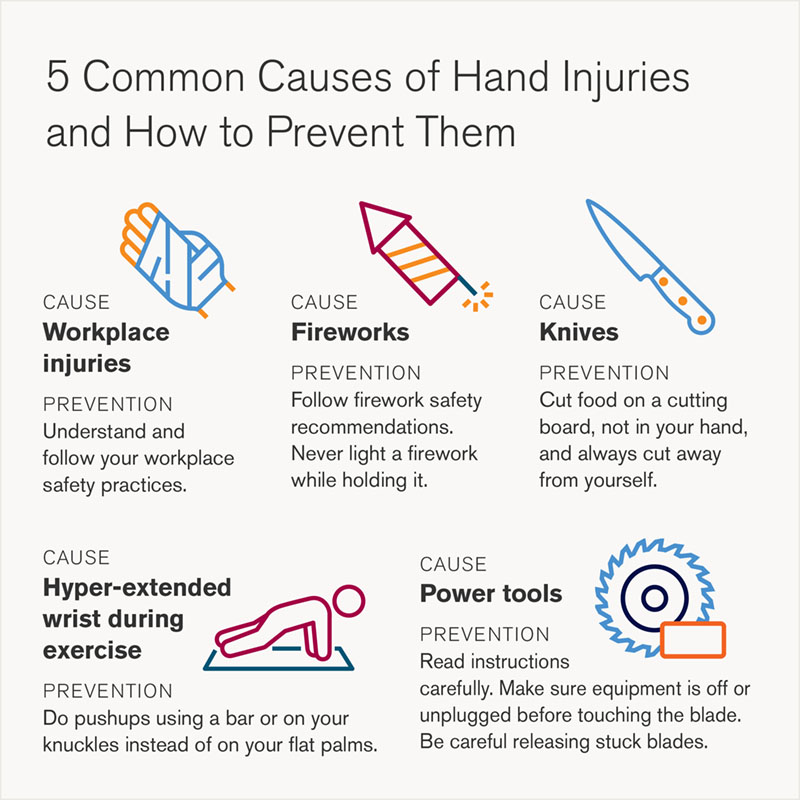Hand Injuries, When to Seek Care and the Latest Treatments
March 25, 2024
Categories: Health & Wellness, Emergency Care
Tags: hand injury

You have 27 bones in your hand and wrist, connected by a network of muscles, tendons, ligaments, nerves and blood vessels. This complex structure provides the strength to grip tightly and the dexterity to perform the most precise movements.
Because your hands are front and center in almost everything you do, hand injuries are common. Loyola hand surgeon, Sahitya Denduluri, MD, treats a wide range of hand injuries. “We use nonsurgical approaches when possible,” says Dr. Denduluri. “When surgery is necessary, we use advanced techniques to restore hand function while minimizing stiffness and pain.”
Types, causes and prevention of common hand injuries
Common hand injuries include:
- Broken bones
- Burns due to heat, chemicals or frostbite
- Cuts
- Infections
- Loss of a finger or hand (amputation)
- Sprains, a stretch or tear in a ligament that connects bones
- Strains, an injury to a muscle or tendon that connects muscle to bone
The causes of hand injuries vary with age. Children tend to injure themselves during sports or play. “You usually can’t prevent those injuries,” says Dr. Denduluri.
Adult hand injuries are usually due to falls or accidents. From workplace incidents to improper handling of fireworks to misuse of power tools, prevention is often a matter of common sense and thinking before you act.

When to see a doctor for hand injuries
For severe hand injuries that involve a broken bone or severe bleeding, it’s important to seek emergency care.
Animal bites also require immediate attention, even if the animal is fully vaccinated. “Patients often ignore bites for several days,” says Dr. Denduluri. “At that point, it’s often a full-blown infection that may require surgery. Early antibiotic treatment in the emergency room or by your primary care doctor can prevent a serious infection.”
Dr. Denduluri also recommends talking to your doctor if you experience:
- Bruising after a trauma
- Numbness or tingling in your fingers
- Severe pain
- Signs of infection, such as redness, swelling or fever
Hand injury treatments and hand surgery
When possible, doctors try to avoid hand surgery. Non-operative treatments your doctor may recommend include:
- Anti-inflammatory medications
- Elevation
- Ice
- Immobilization with a splint or cast
- Rest
- Physical therapy
If surgery is the best option, Loyola Medicine offers leading-edge treatments, including:
Intramedullary implants are metal rods doctors insert inside a fractured or broken bone to provide stabilization. They are a common treatment for large bones. Over the past five to 10 years, this technique has expanded to hand surgery, though the pins and screws are much smaller.
“We insert a screw down the center of the bone through incisions smaller than a grain of rice,” says Dr. Denduluri. “There is usually no need for immobilization after surgery, so you can start moving right away. This minimally invasive approach helps preserve overall function of the hand or finger.”
Arthroscopy is a minimally invasive surgery to treat joint problems. The surgeon uses a thin tube equipped with a video camera and long instruments. Dr. Denduluri performs arthroscopy to repair certain wrist injuries.
Despite its name, microsurgery typically uses larger incisions than minimally invasive surgery. Surgeons use a microscope and sutures finer than a human hair to repair nerves and blood vessels. You may need microsurgery to reattach a severed finger or repair a traumatic injury.
Delayed treatment of an infection can cause it to spread to surrounding structures. An infection may require open surgery to drain pus or remove infected tissue. Infections can occur through:
- Animal or human bites
- Spread of an infection from somewhere else in the body
- Untreated cuts
Peripheral nerves are those that lie outside the brain and spinal cord. Dr. Denduluri uses peripheral nerve surgery to:
- Borrow a nerve from one area to repair — or rewire — an injured nerve in the hand or wrist
- Relieve a pinched nerve, such as in carpal tunnel syndrome
If you have lost a finger, hand or forearm, the nerves that lead to that limb still carry electrical activity. Doctors use nerve surgery to:
- Reduce phantom pain: This pain feels like it is coming from the lost limb. Phantom pain occurs due to mixed-up signals between the remaining nerve endings and the brain. During surgery, Dr. Denduluri reroutes these nerves to decrease pain.
- Power an electric prosthesis: Doctors can harness the electrical activity from nerves in the remaining limb to control a prosthetic device. “We use machine learning and pattern recognition to translate the electrical signals into movement,” says Dr. Denduluri. “This technology is improving, allowing patients to move the prosthesis in more ways than previously possible.”
Carpal tunnel syndrome and trigger finger
Carpal tunnel syndrome and trigger finger are common hand and wrist conditions:
- Carpal tunnel syndrome is a pinched nerve at the base of your palm. It causes numbness and tingling in the thumb, first finger and ring finger and muscle weakness in the hand.
- Trigger finger is the inflammation of a tendon (tendonitis). Tendons connect muscle to bone and glide against the finger bones during movement, like a pulley. When the tendon becomes inflamed, it rubs on the pulley and can get stuck. Your finger may pop when you bend or straighten it, or lock in a bent position.
Many people think carpal tunnel syndrome and trigger finger result from repetitive activities or poor ergonomics. “Studies show that some people are more susceptible to these conditions due to their genetics or individual anatomy,” says Dr. Denduluri. “Frequent typing or the position of your desk chair may have little to do with it.”
Treating carpal tunnel syndrome
The first treatment is to wear a wrist brace at night to keep your wrists straight. Flexing your wrists while you sleep can pinch the nerve even further.
If symptoms persist, your doctor may recommend carpal tunnel surgery — a type of peripheral nerve surgery — to release the pinched nerve. “At Loyola Medicine, we often perform surgery while you are awake using local anesthesia to numb the wrist,” says Dr. Denduluri. “You can drive home after surgery and resume activities right away.
If you have symptoms of carpal tunnel syndrome, Dr. Denduluri recommends talking to your doctor. The sooner you receive treatment, the more likely you will recover fully. People who have a pinched nerve for many years may not experience complete relief of symptoms, even after surgery.
Treating trigger finger
Steroid injections are a treatment option for trigger finger to reduce inflammation of the tendon. If symptoms continue, you may need surgery to take the pressure off the tendon. Trigger finger surgery is similar to carpal tunnel surgery and involves only local anesthesia to numb your finger.
Hand surgery at Loyola Medicine
Loyola Medicine offers comprehensive hand and wrist surgery for all types of hand injuries. As an academic medical center, we provide leading-edge treatments not available elsewhere in the Chicagoland area. Our multidisciplinary team of orthopaedic, hand and plastic surgeons work together seamlessly to meet your individual needs.
To find out more about hand surgery at Loyola Medicine, call 888-584-7888 or schedule an appointment online.
Sahitya Denduluri, MD, is a hand surgeon at Loyola Medicine. Dr. Denduluri received his medical degree from the University of Chicago Pritzker School of Medicine and completed his residency at Stanford Health Care.
Dr. Denduluri specializes in nerve surgery, including using nerves to power prosthetic devices. He is passionate about teaching the next generation of doctors. Working with medical students and residents makes him a better physician and patient educator, he says.
Book an appointment today to see Dr. Denduluri or other Loyola orthopaedic specialist by self-scheduling an in-person or virtual appointment using myLoyola.
